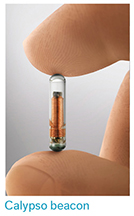
Similar to how the global positioning system (GPS) on your car or smartphone directs you to a desired destination, new cancer-fighting technology can pinpoint the exact location of a tumor in your liver or prostate and track its movement in real time during radiation treatment. Known as Calypso, the system allows cancer doctors to target the tumor with a higher dose of radiation without damaging surrounding tissue and organs.
 “North Kansas City Hospital offers the treatment on its campus in partnership with The University of Kansas Cancer Center,” says Joycelin Canavan, MD, a University of Kansas Cancer Center radiation oncologist who practices exclusively at NKCH. “Calypso was previously approved for treating just prostate cancer, but the FDA recently approved it for all soft tissue tumors except lung. Our first liver cancer patient was only the eighth person in the world to be treated with the Calypso technology.”
“North Kansas City Hospital offers the treatment on its campus in partnership with The University of Kansas Cancer Center,” says Joycelin Canavan, MD, a University of Kansas Cancer Center radiation oncologist who practices exclusively at NKCH. “Calypso was previously approved for treating just prostate cancer, but the FDA recently approved it for all soft tissue tumors except lung. Our first liver cancer patient was only the eighth person in the world to be treated with the Calypso technology.”
Tumor Tracking
 Breathing, coughing and digestive activity can cause body organs to move during treatment, making targeted radiation challenging. Calypso tracks this movement through tiny electromagnetic beacons implanted in or around the tumor. During treatment, the beacons, which are slightly larger than a grain of rice, communicate via radio signal with an electromagnetic array positioned over the patient’s body. The array finds the tumor and follows it throughout the treatment session. If the tumor moves out of the targeted treatment area, the radiation beam shuts down and restarts only when the tumor re-enters the area.
Breathing, coughing and digestive activity can cause body organs to move during treatment, making targeted radiation challenging. Calypso tracks this movement through tiny electromagnetic beacons implanted in or around the tumor. During treatment, the beacons, which are slightly larger than a grain of rice, communicate via radio signal with an electromagnetic array positioned over the patient’s body. The array finds the tumor and follows it throughout the treatment session. If the tumor moves out of the targeted treatment area, the radiation beam shuts down and restarts only when the tumor re-enters the area.
 “Just a few years ago, treating tumors with the high dosage of radiation needed to kill the cancers cells would not have been safe because of the large treatment field required,” explains Mark Thompson, MD, a radiation oncologist with The University of Kansas Cancer Center. “The critical organs surrounding the liver — the stomach, spine and kidneys — would have been damaged. With Calypso, we can localize the tumor to within a 5 mm margin and kill the cancer cells with minimal radiation exposure to those surrounding organs.”
“Just a few years ago, treating tumors with the high dosage of radiation needed to kill the cancers cells would not have been safe because of the large treatment field required,” explains Mark Thompson, MD, a radiation oncologist with The University of Kansas Cancer Center. “The critical organs surrounding the liver — the stomach, spine and kidneys — would have been damaged. With Calypso, we can localize the tumor to within a 5 mm margin and kill the cancer cells with minimal radiation exposure to those surrounding organs.”
Doctors can apply the Calypso technology to newer radiation techniques such as stereotactic body radiotherapy (SBRT), which involves delivering high doses of radiation to the tumor quickly and accurately.
If you’re looking for additional liver and prostate cancer treatment options at North Kansas City Hospital, call our Radiation Oncology Department at 816.691.5216. To read more about the Calypso system, including the results of a recent clinical study, visit varian.com/Calypso.



